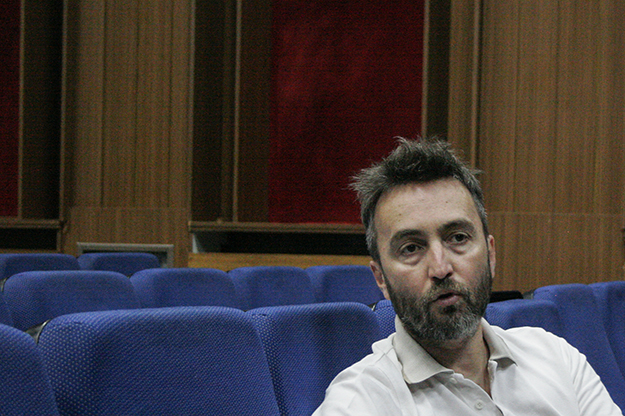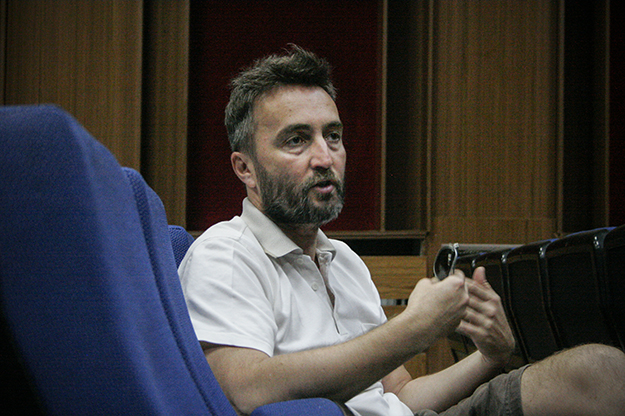The current Edith Durham Square squeezes beside the latest version of Kino Armata. Nearly 50 years ago Armata was a public cinema. In the 1980s it was transformed into the Dom Jugosllovenske Narodne Armije (House of the Yugoslav People’s Army), which was staffed and used by Yugoslav high level military officials and the national police as part of the larger army and police complex.
In 1988, the space was closed by the Yugoslav army because of the political situation in Kosovo. It reopened in 1999 after the end of the Kosovo war and was a part of United Nations Mission In Kosovo (UNMIK) headquarters until 2008, when the space was turned over to the European Union Rule of Law Mission in Kosovo (EULEX). There were occasional public exhibitions but it was primarily used for trainings and other closed door events.
In 2018, the EULEX mission left the property and it went under the ownership of the Ministry of Public Administration, which manages all state properties. An agreement was reached between Minister Mahir Yagcilar and Prishtina Mayor Shpend Ahmeti so that the space could be used by the Municipality, which in turn has allowed the cinema to be run by Foundation Armata, a non-profit organization set up to manage the space and raise funds for the cinema.
The public space Kino Armata was opened on April 18, 2018 to promote alternative culture and social dialogue.
Kino Armata director Alush Gashi says: “We were aware of the space and in 2015, we conducted a study in collaboration with the European Union to find out how the space could be transformed into a public space and cultural center after the departure of EULEX, as it is today.”

Photo: Altin Gashi / K2.0.
K2.0 spoke to Gashi, about the public space, and the art and culture it promotes.
K2.0: The space that is today home to Kino Armata had different functions — it was an army headquarters, a theater for UNMIK and EULEX officials — why did you decide to transform it into a place for the public and artistic community?
Alush Gashi: A few residents of Prishtina and myself knew about the existence of this place [Kino Armata] before it was reopened for the public in April 2018. Since it was outside of the public domain for 30 years, when it was closed for public functions in 1988.
So the few of us who knew about the existence of this space [Kino Armata] knew that it had potential due to the location, the environment. As a kid, I came here to watch films and was present for many events that were held here.
Me and my friends have nice memories from that time. Armata at the time was one of only three active cinemas in town. I remember that we used to watch movies with famous actors, like Bruce Lee, Bud Spencer, Terrence Hill and others.
Because of its location in the center, we used to gather outside of the cinema even when there wasn’t a movie to see. The theater was surrounded by greenery and we used to hang out there eating the famous KRAS chocolates produced in Zagreb.
Five years ago, together with a few colleagues from the European Union, we conducted a study about how the space could be transformed into a public cultural space. The study was conducted in collaboration with officials from the European Union and other foreign collaborators, and it produced a potential program.
The recommendation that was drawn from the study was to give ownership of the space to the Municipality of Prishtina or some other independent authority, after it would no longer be used by UNMIK and EULEX, with the idea of an institution managing it and transforming it into a public cinema, as it was up until 1988.
When UNMIK and EULEX left the space a couple of years ago, the public property was given to the Municipality [of Prishtina] and a foundation was created which now funds the cinema independently. The general idea and mission of the cinema is to promote alternative culture and social dialogue through mediums such as film, as the main pillar, but also music, debates of public interest etc. So the idea was to create a sort of forum in which critical thought is cultivated.
How much has the space changed from 1988 when it became private?
Physically, the facilities have not changed much, especially the [cinema] hall in where we are now and where all activities are organized. Luckily the interior has remained the same, and I say luckily because we have something that was built 40 years ago. The only change is the new chairs that were brought in seven years ago, otherwise the cinema hall is completely the same as it was back then.
In truth, culture is what shapes the state, because through culture you are identified on an international basis.
The building is now used by the Municipality [of Prishtina] in collaboration with a few ministries [of the Republic of Kosovo] and is managed by us [Kino Armata employees]. In general, we’ve tried to preserve the authenticity of the space from an architectural aspect by including old furniture and music equipment of that period. So the objective was to preserve the spirit of cultural heritage.
In Prishtina, there is an impression that there are not many places where people can take part in different activities, especially in the field of art and culture. Was the establishment of Kino Armata a necessity?
Yes, it was a necessity. One of the main principles which pushes Kino Armata forward is its public character, the collaboration/interaction and general work with the community. Kino Armata is an independent public space that curates its own program and simultaneously encourages the community, organizations, individuals for projects of public interest, to utilize the space and collaborate with us, for the benefit of the public.
In this phase of the creation of Armata’s identity, we are limited to public activities and events that are accessible to all, because we believe that comprehensive inclusion in debates after film screenings are important for understanding the meaning of artistic works, because it contributes to social advancement.
But in our country, very little importance is given to culture, because it seems that politicians do not prioritize the state development of culture. In truth, culture is what shapes the state, because through culture you are identified on an international basis.
What does the name Kino Armata represent for the social community of Prishtina? How does the space relate to the collective memory of this community and of Prishtina in general, considering that the name is related to this issue [the name being from the Yugoslav period]?
It is a good sign due to the reputation that Armata has, because the initiative and project has been welcomed. As you said, there are not many usable spaces of this kind and size. We have other public halls, but they are not attractive for youth and artists, and thus are not used.
The name Kino Armata came naturally because the building is known in society as the “Army House.” It goes hand in hand with our mission of preserving a collective memory that, be it good or bad, serves to shape us.
We believe that the things that have happened here, or the architecture that was created at a certain period of time, no matter what period that was and the symbolism that it had, should be researched and inherited physically and spiritually, by preserving the name and discussing a discourse that I do not consider to be harmful at all.
The symbolism of the time period is something that we cannot avoid, and the name is what keeps that period of time alive.
Was there opposition to the name?
We had debates, individuals who were against it, but ultimately we reached an agreement after hearing all arguments, because many people have good memories of this space when it was used for film screenings and other events. The symbolism of the time period is something that we cannot avoid, and the name is what keeps that period of time alive, enabling us to study it further.
How is Armata functioning today? To what extent has the desired objective been achieved?
The space is functioning well. In the beginning we developed a concept about how we wanted to run the project. This [Armata] is a cinema, but it is not only a cinema, because we’ve tried to promote alternative culture by promoting films, different artistic works, bands that probably wouldn’t have had access to the public because they are not commercial.
On the other hand, we do not screen the same film for two weeks, because we try to screen many films and artistic works, so that we can have diversity and lots of debates. The community have welcomed and supported Armata, which is the most important thing.
The Municipality of Prishtina, our main institutional partner, invested and provided us with a projector, a sound system and some other production equipment. We are on the same level as other cinemas around the world, because we have digital technology. We are also partnered with the Swiss Agency for Development and Corporation in Kosovo.
We believe that Kino Armata is a very important project because it serves and helps all people who want to express themselves. The community, as well as our partners, keep Armata alive. This has encouraged us to make medium-term and long-term plans for Kino Armata.

Photo: Altin Gashi / K2.0.
What is the primary function of Kino Armata in this context? What does it promote mostly? What is the main pillar of your program?
The main pillar is film, around which we have debates. It is understandable, because it is a cinema. The films that we screen are our channel of promotion and it is very important to have them screened on the big screen, to have them seen in the manner in which directors envisioned them, on a big screen and with a good sound system.
It makes an impression. The topics we cover are important and relevant for certain periods. For example, in October we had films that cover the issue of racism, how it was treated before and how it is treated now, advocacy against racism. In the last week of September, we screened films that covered the issue of migration.
We develop these topics with different partners. For example, the topic of migration was developed in partnership with the U.S. Embassy. So these are topics with historical relevance. But we also screen works that are important in current times.
What is Kino Armata’s position in the network of art institutions in Prishtina?
In general, I think that art and culture is developing more intensely. Many institutions that are similar to Armata have been established, but Armata is different because it is a public space. However, on the other hand there are private initiatives and individuals who are doing excellent work in the field.
Lately, Armata has become a key actor in the network of independent cultural institutions. We are lobbying together to push forward our agenda.
Recently, we utilized the momentum of the election campaign [snap parliamentary elections in Kosovo, 2019] to organize a debate where we invited political actors so that we could communicate with them about how they can help us, and find out more about their approach to issues that interest us, such as their approach toward cultural institutions. As well as issues like modernist architecture in Prishtina, of which there is much controversy about whether or not it should be preserved. So Kino Armata has a relatively unique public cultural space has a role and responsibility in society due to its public character.
Because any manner of expression or opinion is allowed, as long as it does not represent hate speech. It doesn’t matter if it is intriguing or intellectually challenging.
How does Kino Armata serve the community in the field of art and culture, and on the other hand, how does it serve the “consumers” of this field?
We are very open to initiatives and organizations about any issues that are of public interest. People who are interested are free to come and apply, to discuss their work. This is the direct way in which the space can be utilized.
Moreover, we acquire copyrights for all films that we screen here, and this is important because it is the proper way of functioning. You have to request permission from the author before screening their film. In cases where organizations have selection dilemmas for film screenings, we provide them with help. So we are close to the community of artists and citizens.
Does Armata serve the community of underground and alternative artists?
Yes, that is the point. Because any manner of expression or opinion is allowed, as long as it does not represent hate speech. It doesn’t matter if it is intriguing or intellectually challenging. This kind of content is welcome, because the space is open to debate and artists are free to come and present their ideas. It helps them understand their work and brings the public closer to them.
What was the first activity organized by Kino Armata and what activities is it organizing now?
The first activity was organized in April 2018. It was the screening of the film “The Cabinet of Dr Caligari,” and the performance of Tetris band. The reason was relatively clear: The two main pillars of Armata are film and music. Film is the primary pillar, and music is something that is undeniably related to film. Tetris is Armata’s artistic collective. They help us curate the music events program.
Why did you choose a silent film for your first screening?
For two reasons: One was that we wanted to incorporate the aspect of live music, to show that the space will be an open one, and the other was that Cabinet is a film with historical importance, especially in the period of German expressionism. I think it is inspirational for all directors. So Armata is open to screen films that are not commercial, because even though not everyone enjoys silent films, their visual and conceptual importance is undeniable.
You definitely don’t see these films in every cinema. That is very admirable.
Yes. And another thing we want to do, since everything is done online these days, is to enable people to download films online. But it’s better to see them on the big screen, better to see them in a broader context, because then a debate can be developed with the community. We must highlight that cinemas, as a physical institution, has an objective to entertain, but also to develop critical thought.
Lastly, what message do you have for citizens who are not familiar with Kino Armata?
Come to Kino Armata! I don’t have any particular message, but it would be good for them to follow us, because our program is quite rich. I understand that the repertoire might not be for everyone, but we try to select the films that we screen based on visual, artistic and historical importance. I must highlight that Armata is not only a space for artists, but for the whole community. K
This conversation has been edited for length and clarity. The interview was conducted in Albanian.
Feature image: Altin Gashi / K2.0.



